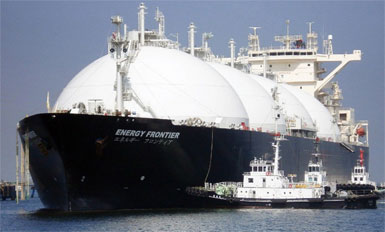Sadly, the federal government is following through on its decision to export fracked natural gas.
Under intense pressure from Republicans in Congress procedures for approving liquefied natural gas (LNG) plants have been streamlined and at least seven have been approved this year: two in Oregon, two in Louisiana, one in Florida, one in Texas, and now, Cove Point in Maryland.
The pressure to export is supposedly meant to assure Europe and Ukraine they will have gas, but the fact is, it will be shipped to countries around the world.
Combined, they have permits to export more than 4 billion cubic feet of natural gas every day… for 20 years.
"In supporting liquefied natural gas exports, President Obama is treating climate change like a game of peak-a-boo, opening his eyes to the harmful impacts of carbon but closing them to the devastating disruption potential of methane. Allowing more
LNG exports completely counteracts his expressed commitment to
reduce emissions and protect the public health," says Kate DeAngelis for Friends of the Earth.
After 80,000 people protested (and sent 150,000 comments) against the Cove Point LNG facility, the Federal Energy Regulatory Commission (FERC) approved it – the first large-scale plant to be sited in such a densely populated residential neighborhood. It will ship gas to India.
Mega-polluter Dominion Resources is building the massive $3.8 billion facility, which is bound to lead to a new web of pipelines and even more fracking in the mid-Atlantic region, not to mention the pollution caused by liquefying it and shipping it across the ocean. And FERC refused to do a full Environmental Impact Statement.
A LNG tanker:

"FERC’s decision to allow LNG exports from Cove Point is fundamentally flawed because the agency failed to consider the simple fact that exporting LNG will mean more drilling and fracking, and that means more climate pollution, more risk of contaminated groundwater, and more threats to the health of people who live near gas wells," says Deb Nardone, director of Sierra Club’s Beyond Natural Gas campaign.
Chesapeake Climate Action Network and Earthjustice, the nonprofit law organization that has been representing the Lower Susquehanna Riverkeeper, Patuxent Riverkeeper, Potomac Riverkeeper, Shenandoah Riverkeeper, and the Sierra Club in the FERC proceeding, plan to petition FERC and potentially to sue the agency to challenge an inadequate environmental review.
The natural gas industry is fighting hard to start exports because the industry has grown so quickly that there’s a glut of gas in the US. The ability to export would enable the industry to get higher prices in the US and abroad. Republican House leaders have called on the Department of Energy to approve all 20 pending LNG export applications by the end of this year.

